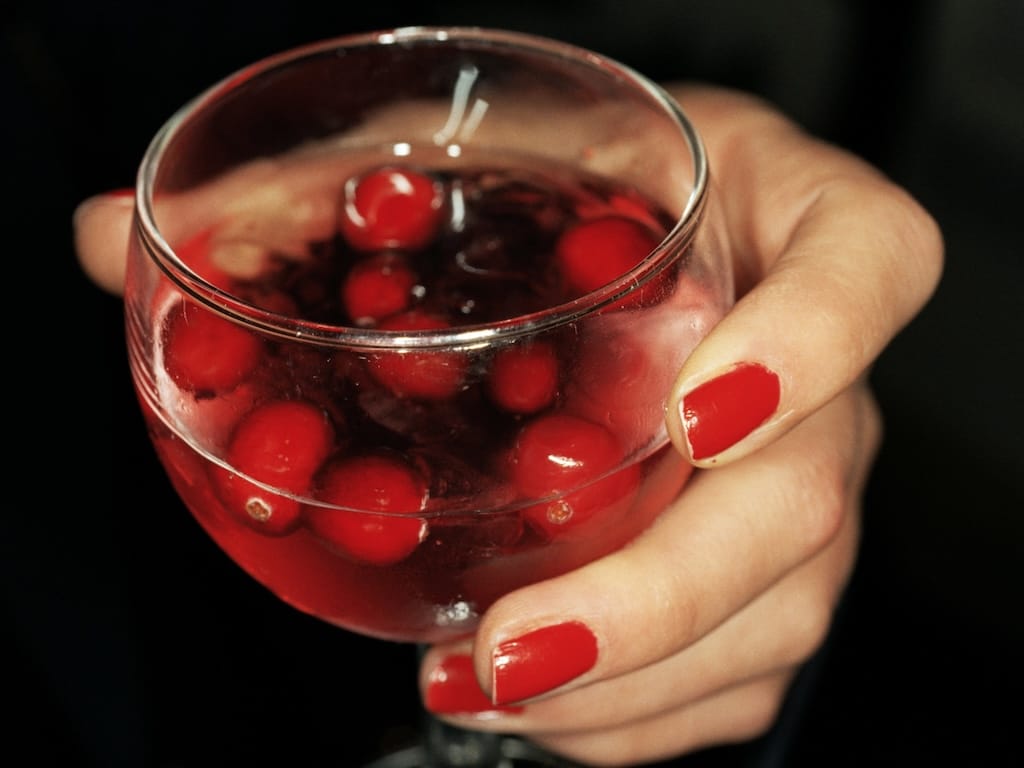First things first, there will be no Friday night dinner next week because I'm leaving tomorrow to visit my brother in Switzerland for ten days. There's a chance I'll get bored enough on the plane to write one, but I'm hedging my bets in the likely event it doesn't happen. The only book I'm bringing with me is "Swann's Way," so my options are reading that, watching questionable in-flight entertainment, being productive, or falling asleep on pills and having weird dreams about suffocation. Even if it's only temporary, I'm happy to escape the US before the government revokes all women's passports and credit cards, fully transporting us back nearly a century. Per usual, Aparna Nancherla has perfectly summarized my feelings as of late:
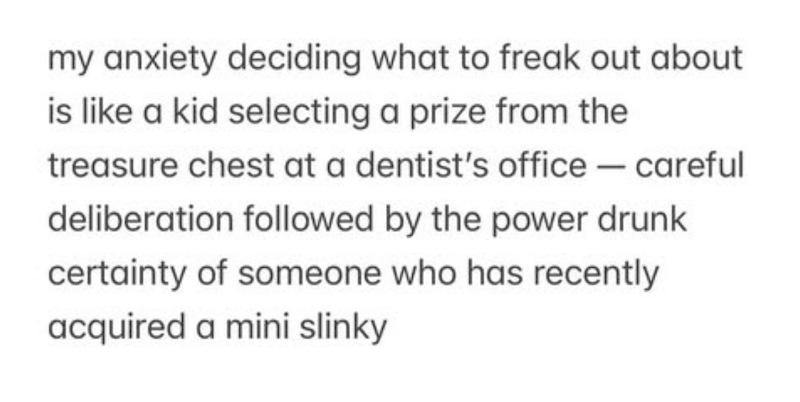
Since I've been unrelentingly negative, here's a brief list of glimmers from my gratitude journal (jk I don't have one of those):
- This woman who does her makeup in the style of different artists, like Caravaggio and Frida Kahlo.
- Revisiting Tom and Lorenzo's "Mad Style" recaps.
- Buying a chair from a crazy (complimentary) woman in Bay Ridge on Facebook Marketplace and talking to her and her husband about MCM restoration projects in their backyard full of plants
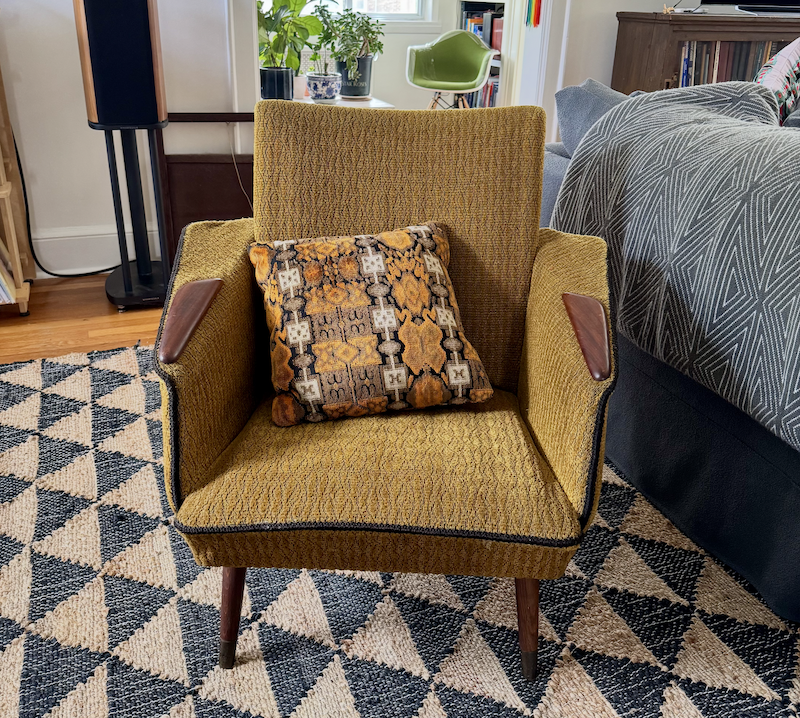
- This Ben Whishaw interview (mostly the pictures) in The Times. More men in tiaras, please.
- Channeling Nicholas Cage and Cher as the chandeliers go up at the Met.
Let's see if these videos fuck up my email deliverability.
Normally, six items in a list would bother me enough to delete one, but fuck it!
The header image this week is c/o Martin Parr, one of the great documentary photographers. The slight chip on the nail polish tips is A+, although where's the cigarette between index and middle? If the image was staged, there would be one because who could resist?
When you hear from me next, whether the following week or next, I'll be in an aeroplane over the sea. Ta-ta.
I'm just now realizing that almost everything on this week's list is an absolute downer, so I promise the next one will be a fun palate cleanser. For those unfamiliar, Chantal Akerman was a prolific Belgian lesbian filmmaker/artist who made nearly fifty films — narrative, documentary, short, feature, musical, romantic comedy — over her lifetime. She's best known for "Jeanne Dielman, 23 quai du Commerce, 1080 Bruxelles" (1983), dubbed "The Greatest Film of All Time" in Sight & Sound's 2022 critics' poll. In 2021, I talked about this film and "Les Rendez-vous d’Anna" (1978) on the Seventh Row podcast, so that might be a useful listen if you want more context. I also wrote an essay for 7R's book on creative nonfiction about two other Akerman films, "News from Home" (1977) and "No Home Movie" (2015), both of which are crucial watches before reading her incredible 2013 memoir, "My Mother Laughs."
Akerman's mother, Nelly, an Auschwitz survivor from Poland, features heavily in her work, whether overtly or as subconscious inspiration. When Akerman wrote "My Mother Laughs," Nelly's health was deteriorating; six months after the book was published in France, she died. The following year, "No Home Movie," Akerman's final film about the end of Nelly's life, premiered; two months later, Akerman died by suicide. I mention this 2-year trajectory of death and physical/mental illness not to necessarily suggest cause and effect, but to give you some sense of Akerman's mindset while writing. For as much as she features her mother in her work and for as close as they were, the relationship was not one of uncomplicated, simplistic love because neither woman was capable of it. Akerman was probably closer to her mother than anyone else in the world, yet she still felt alienated when they were together.
If this type of disconnect resonates with you, I highly recommend firing up the Criterion Channel and embracing Sad Girl Autumn (a concept Akerman would loathe, btw). After you've properly immersed yourself in repetitious isolation and anxiety, crack open "My Mother Laughs" and get ready for a stream of self-loathing classics, like "I belonged but felt even more alone," and "As usual, I'm going to sleep early to escape life." And of course, if you're in New York, go check out MoMA's Akerman retrospective. I went to a screening on Monday and emerged in a strangely good mood, having somehow managed to see three of her cheekier shorts (a strange way to describe a documentary centered on Holocaust survivors, but it's true).
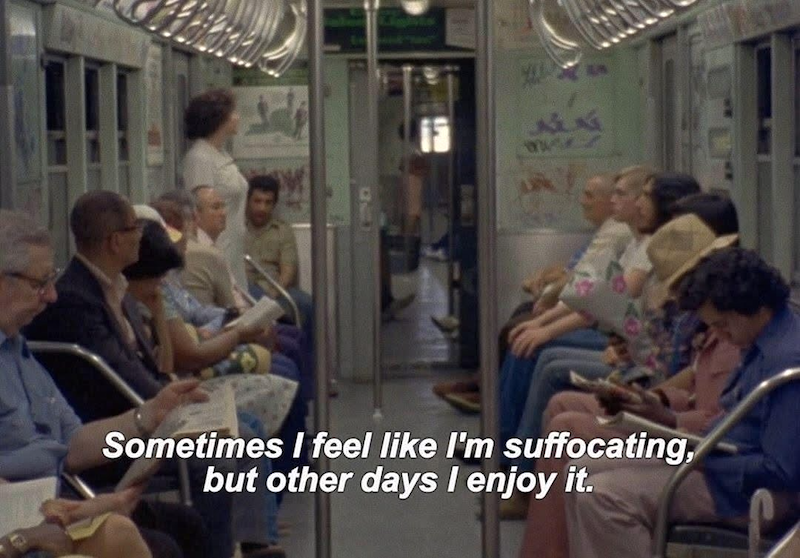
Read if you like: Tove Ditlevsen, Deborah Levy, bed rotting, Jonas Mekas (although, um... yikes), Marguerite Duras, SSRIs, dissociating, stress-smoking.
Dorothy Baker's "Cassandra at the Wedding" (1962) is one of my all-time favorite novels and I thank whatever mystery chain of events led to its 2022 resurgence because I'm not sure I would have discovered it otherwise. "Cassandra" is what really set me down the path of voraciously reading reprints from publishers like NYRB, McNally Editions, New Directions, Deep Vellum, etc. I'm now obsessed with hunting down excellent writers who either never hit it big during their lifetimes and/or fell out of print after death. It's not that I dislike contemporary literature, I just feel like the publishing industry is broken and full of too much hot garbage clickbait bullshit written by people who are either already famous or independently wealthy. As a result, talent from unknowns goes largely unnoticed unless the stars magically align.
If I had a nickel for every time I DNF-ed some hastily edited goobledegook, I could fund the necessary weed purchase to erase it from my brain. Unfortunately, weed lobotomies aren't selective, so I'd likely also be removing crucial information like what I'm doing in the room I've just entered and the name of a person I exchange pleasantries with nearly every day. But I digress! When I fall in love with a novel, it always takes me a long time to read something else by the same writer because I'm afraid it will pale in comparison. If I hold off, I have the anticipatory pleasure of another potential banger waiting in the wings. Case in point: Baker's first novel, "Young Man with a Horn" (1938) has been sitting on my shelf, untouched, for three years. I'm too afraid to read it because what if it sucks and then there's no more Baker left? ("Trio," her lesbian pulp second novel is stupidly still out of print along with "Our Gifted Son," which is allegedly a mess.)
Thankfully, there are usually short stories, the perfect way to see if an author's magic carries beyond a single novel without exhausting major resources. After reading "No Visitors Till Noon," I can officially say that Baker certainly isn't a one-trick pony. In this story, a woman named Sibyl is at home waiting for news from the hospital with a status report on her terminally ill husband, when she receives a call from someone else: Maggie, an old college classmate whom she barely remembers. They have a brief, slightly awkward conversation before Sibyl informs her that they'll have to catch up another time because she's waiting for a call. A few moments later, the doorbell rings and it's Maggie in the flesh:
There was a woman standing there, and when the door opened, she withdrew her gloved hand from the button she was pressing. She wore dark glasses and a floppy black hat and a black linen dress. An obvious example of a witch in gloves, and she spoke in a voice she knew the use of, a cool light breeze of a voice.
As with "Cassandra," Baker reveals her characters in pieces, allowing them to remain slightly enigmatic through the very end. She lures you into believing one version of events and then slightly shifts the perspective to reveal something else entirely. Her writing style is enviously dark/cool/witty and had she lived long enough to see Akerman's debut, I think she would have loved her. Both are patron saints of depressed queer people trying to figure out how to exist in a world they don't understand and can't easily escape.
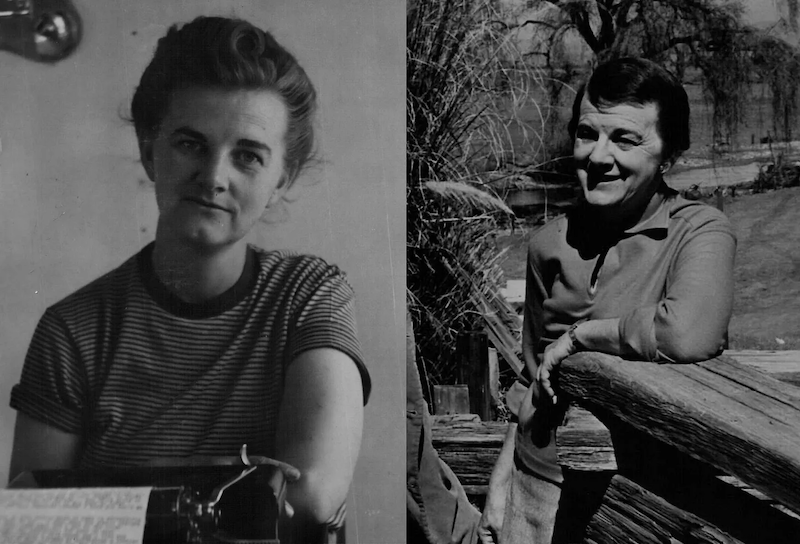
Read if you like: "The Pure and the Impure," Caroline Blackwood, Esther Greenwood, people who mask their sadness with drugs and alcohol, Don Draper, Hemingway.
Ann Patchett is one of those writers I undervalued for too long, I think probably because her early book covers are all very 'faux-intellectual mom's book club circa 1995.' They're not nearly as bad as Elena Ferrante's, but I would never pick one off the shelf out of sheer curiosity if I wasn't already aware of her reputation. This could be some form of internalized misogyny or, more simply, a distaste for bad design; either way, her writing is eons more sophisticated than covers like this might lead you to believe. As a result, I didn't read anything by her until 2019 when "The Dutch House" premiered with legitimately intriguing cover art by Noah Saterstrom. From there, I went back and devoured the rest of her work (minus "Tom Lake" because of my aforementioned book edging practice), routinely kicking myself for waiting so long.
If, like me, you've avoided Patchett for shallow reasons, her new personal essay in The New Yorker is the perfect low stakes way to see why she's so revered. Like everything else in this week's FND, "Glowworms" deals with a bleak topic (death); only, because it's written by Patchett, an optimist, and not a true depressive like Akerman or Baker, it's ultimately pretty life-affirming.
The essay revolves around a trip to Australia and New Zealand that Patchett and her husband, Karl, are set to take in 2024. Leading up to it, three important figures in their lives (two humans, one dog), are on the brink of death and they have to decide whether to cancel the trip or make peace with the fact that their bon voyage goodbyes might be final. Eventually, Patchett and Karl make it to the Southern Hemisphere, where they meet up with another couple (Meg Mason of "Sorrow and Bliss") and confront their own mortality in the midst of natural wonders. It's hard to write about an essay without spoiling the elements that make it special, so just set aside twenty minutes and read it. Here's an enticing snippet:
I had a few bites of Meg’s Vegemite toast—thin layer of butter, thin layer of Vegemite—then started making my own. My sadness was neither resolved nor ignored, but it softened. This is something the tourism board might consider advertising: “Go to New Zealand and soften your sadness.”
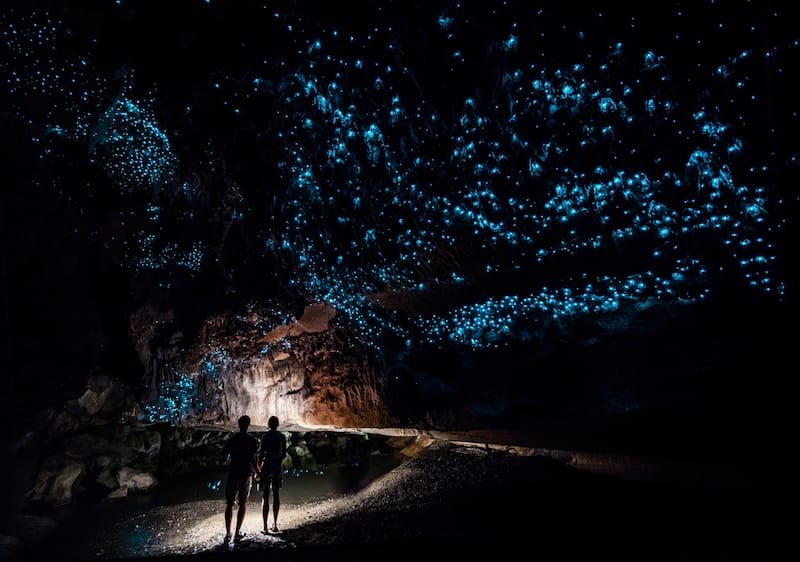
Read if you like: Elizabeth Strout, Marilynne Robinson, Ian McEwan, Perfume Genius's comments on "Gilmore Girls," friends who make you feel safe/comforted even when the world is shit.
I got my flu/covid shots Wednesday evening and woke up Thursday feeling like I had been hit in the face with one of Kevin's rooftop bricks from "Home Alone 2." As I crawled into bed at a respectable 6:30pm, I got the sudden urge to emotionally devastate myself by revisiting "The Deep Blue Sea," Terence Davies's adaptation of Terence Rattigan’s 1952 play. Had I not fallen asleep at 9pm, I would have also watched Carrie Cracknell’s National Theatre Live production from 2016 with my beloved Tom Burke. Maybe I'll download that one and add it to my plane boredom list.
The story is a common one, but the way Davies — along with Rattigan, and Cracknell — tells it is extraordinary. Hester Collyer (Rachel Weisz) is unhappily married to a posh judge with a cunty, overbearing mother. When she begins an affair with Freddie (Tom Hiddleston), a former RAF pilot, her passion is briefly reignited. She leaves her husband; falls deeply in love; and then, less than a year later, attempts suicide. It turns out, Freddie isn't everything she wants him to be. He's not over the war, he's a drunk, he makes dumb jokes about a Georges Braque painting that leads to an art gallery screaming match. Their relationship is volatile, and, because it's explained through Hester's perspective/memories, isn't very generous to Freddie. Based on initial evidence, it would be easy to write him off as an emotionally unstable jerk who treats his girlfriend poorly and masks his problems with alcohol; through Davies's brilliant direction and Hiddleston's subtle performance, we slowly begin to realize a "this guy's a twat" read is far too basic.
Unlike the play, which takes place in a single room and unfolds linearly, Davies's film adaptation goes back and forth in time, dipping into Hester's memories while slowly progressing through the day of her suicide attempt and into the following morning. There's a great sequence early on of Freddie and Hester in bed together, a tangle of naked limbs shot from above as the camera circles. In a seamless superimposition, the shot transitions to a later one of them where Hester's in a nightgown and Freddie is under the bed covers. Then, finally, another superimposition and Hester's alone, lying on the ground after gassing herself in the same nightgown. We see the affair's progression from unbridled passion to comfort to unspeakable pain, relying on the rest of the film (and careful analysis) to fill in the missing pieces.
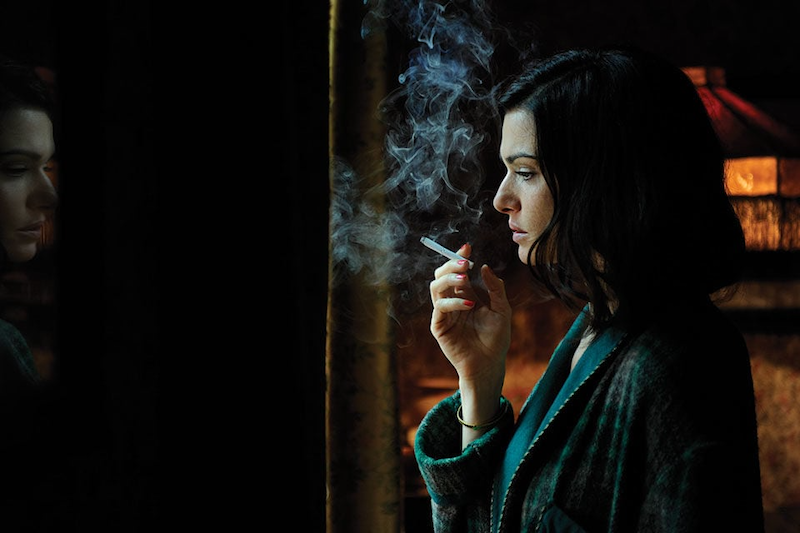
Watch if you like: Douglas Sirk, "Anna Karenina," "Brief Encounter," crying alone in a dark room, being reminded that those shitty Marvel movies don't deserve Tom Hiddleston, incredible wallpaper.
Fans of Elena Ferrante's Neapolitan novels/the HBO adaptation should watch "The Eight Mountains" (based on Paolo Cognetti's 2016 novel), currently streaming on Criterion Channel. Like Elena and Lila, Pietro (Luca Marinelli) and Bruno (Alessandro Borghi) connect in childhood, grow apart in adolescence c/o class divides, and come back together to support each other when shit hits the fan in adulthood. Pietro is the friend who leaves and Bruno is the one who stays. Despite major personality and worldview differences, they find meaningful ways to stay in each other's lives for decades.
"The Eight Mountains" is quieter and more restrained than Saverio Costanzo's "My Brilliant Friend," though. In his New Yorker review, Richard Brody calls it "pretty and vacant [...] not a movie so much as a series of postcards." While I disagree, his POV isn't without merit. Absent much dialogue, the viewer is left to spend time with two men in the Italian Alps, a place so beautiful and meditative that how could it 𝘯𝘰𝘵 facilitate one of the gentlest, most supportive male friendships of all time? I also think the filmmaking plays on the traditionally "masculine" stereotypes of silence and self-sufficiency, only these men are emotionally intuitive enough to understand each other on an unspoken level.
If the above didn’t sway you, the knitwear is BONKERS good and the beards are bearding at the highest level. 10/10 on visuals/fashion/sex appeal alone.
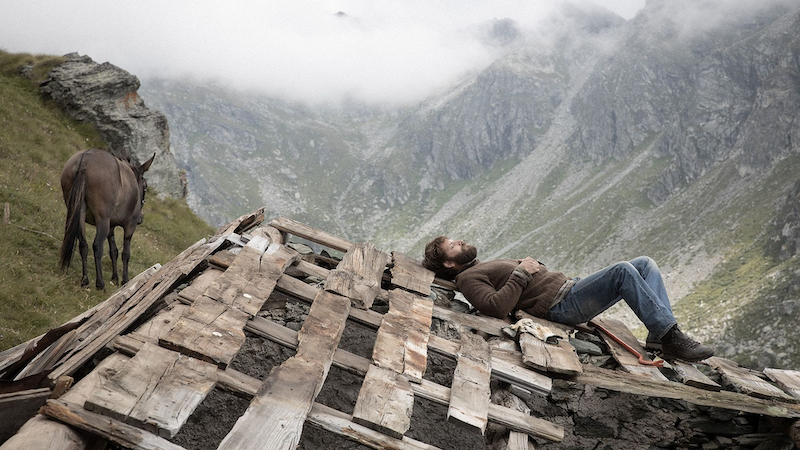
Watch if you like: "Oslo, August 31st," "Old Joy," "Here" (Bas Devos), Viola Ardone, Elena Ferrante, Dino Buzzati, Stan Rizzo's look in "Mad Men" S7, dreaming of shirking all technology and relocating to a primitive cabin in the Alps.
I leave you with yet another fabulous children's book recommendation, this one about an asshole cat named Francis who gets scolded for all kinds of shit even though he's solely responsible for saving his apartment building from fiery ruin. Miss Moon should reward him with a tray of sushi instead of shaming him for jumping on heads. Let the boy live.
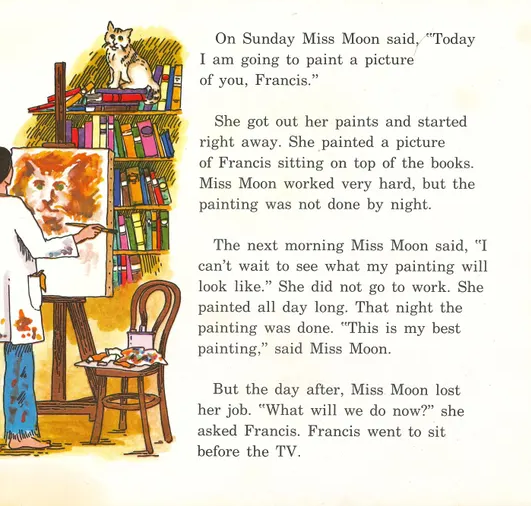
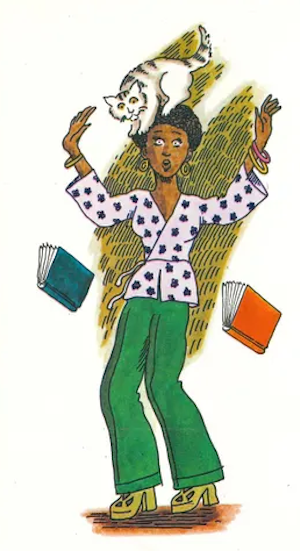
"Who is Francis?" (1975) by Katherine Tippetts Steiger with illustrations by John Trotta.

